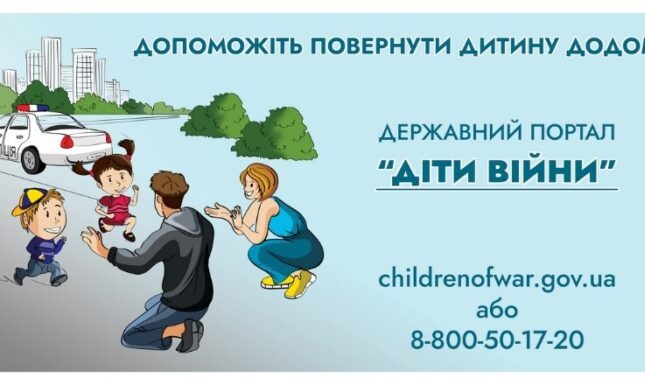Accounting for ALL missing persons in Ukraine?
After the 2022 Russian invasion in Ukraine, many persons went missing. On both sides of the border, parents are searching for their children. Should Ukraine account for all of them? Why? How?
Introduction
News reports about Ukrainian children being forcibly deported by Russian forces appeared in December 2022, leading to arrest warrants issued by the International Criminal Court against President Putin and the Russian Ombudsperson for Children Lvova-Belova in March 2023. Reports by international and Ukrainian NGOs and researchers state that Russian federal governmental authorities have systematically relocated at least 6,000 children from Ukraine to re-education and adoption facilities in Russian-occupied Crimea and Russia. Many parents and other relatives have been unable to contact their children or receive any information about their whereabouts.
Russian parents trying to obtain information about the fate of their missing sons serving in the Russian army receive less news coverage, with the exception of the story of a mother of a conscripted Russian soldier who travelled to Ukraine to visit morgues to find her son. Understandably, from a political and military strategic perspective, the Russian government remains silent about the number of Russian soldiers killed and missing in Ukraine. Early February 2023, Western officials estimated that nearly 200,000 Russian soldiers have been killed and wounded. And perhaps, also understandably, with Russia being considered the aggressor, the suffering of Russian parents of missing soldier sons attracts less attention from the Western media.
In this blog, we focus on all persons who went missing in Ukraine following the 2022 Russian invasion, including Ukrainians and non-Ukrainians, civilians, journalists, foreign combatants, and Russian Federation soldiers. According to estimates of the International Committee on Missing Persons (ICMP) in November 2022, at least 15,000 people have gone missing during the war in Ukraine; please note that ICMP does not specify if this number only comprises (Ukrainian) civilians. The question we discuss in this blog is how and why is it important to account for all the missing in Ukraine?
Data for this blog was collected between November 2022 and March 2023 using various methods: review of relevant national and international laws; review of English-based policy papers and news reports; interviews with members of Ukrainian NGOs for missing children, ICMP, a Ukrainian lawyer; and written correspondence with the Ukrainian Ombudsman (Ukrainian Parliament Commissioner for Human Rights).
Why important?
Missing person cases often entail multiple human rights violations, including violations of the right to life, liberty and security, the right to justice, the right to a family life, and the right to an effective and official investigation. These rights of missing persons and their relatives are prescribed and guaranteed by numerous international human rights treaties and international humanitarian law. Most importantly, the 2010 International Convention for the Protection of All Persons from Enforced Disappearance (ICPPED) obliges states to investigate acts of enforced disappearance after an individual has reported the case to the authorities (art. 12.1), and sometimes also in cases when no formal complaint has been raised (art. 12.2). States are obliged to conduct an effective investigation into missing persons, namely a criminal investigation to establish liability as well as an investigation that sheds light on the whereabouts of a missing person and the circumstances of the disappearance. The ICPPED explicitly recognises families of disappeared persons as victims and provides them with a number of rights, including the right to reparation, compensation, to know the truth and return of the remains to the family (art. 24). In a situation of ongoing conflict our interviews showed, however, that two main factors make impartial and effective investigation difficult to implement in practice.
I. Difficulties in carrying out an effective investigation: internal factors
Legal mechanisms to search for missing persons were already in place prior to the latest invasion. For example, Ukraine adopted The Law of Ukraine on the Legal Status of Missing Persons in July 2018. Following this law, a Commission on missing persons (in 2022 changed to Commissioner) and a central register for missing persons were established. To account for the missing, it is essential that all governmental actors fully cooperate in the search. In Ukraine, however, the Commission on Missing Persons was dissolved two months after it was established and we received reports that the responsible institutions generally failed to cooperate and carry out their duties. This has resulted, among other things, in Ukraine not having one central registry for missing persons but many, which creates confusion and hampers an effective investigation.
II. Difficulties in carrying out an impartial investigation
As noted, it is a state’s duty to account for all missing persons. In practice, however, NGOs, both national and international (ICMP, ICRC), are heavily invested in accounting for missing persons. This applies to historical cases, such as the search for missing persons in the countries of the former Yugoslavia, and it currently also applies to Ukraine. Interviewed representatives of Ukrainian NGOs focused on a specific category of missing persons, such as missing children. They reported that they could and would not consider starting investigations into dead and missing Russian soldiers. However, earlier experiences of international NGOs, such as ICMP and ICRC, show that not only domestic cooperation and coordination, but also cooperation between (former) warrying parties is important. For example, in the former Yugoslavia, deceased and missing persons were often located on the territory of the Other. While countries tend to prioritise the crimes of the Others, in the end this approach often backfires as families of the missing remain in the dark about the whereabouts of their relatives, and it hinders and delays criminal investigations. Hence, when investigations lack impartiality and effectiveness, both retributive and restorative justice are sacrificed.
What is needed?
To ensure retributive and restorative justice, cooperation between Russia and Ukraine is needed. This is easier said than done. In the former Yugoslavia, the missing persons file was part of the peace negotiations after earlier initiatives to establish effective investigations had failed to yield significant results. The Dayton Peace Agreement of November 1995, which put an end to the Bosnian war of 1992-1995, allows for a so-called joint exhumation programme. This permits graves registration personnel of one party to enter the territory of the Other to find dead and missing persons (Annex 1A, art. 9). In the ongoing war in Ukraine, where families of the warring states are searching for their children, the need for accountability and justice for the families is crucial, on both sides of the conflict. The missing persons file should be central to national and international efforts to find a political settlement to the war, providing all parents access to information about the fate and whereabouts of their children and allowing them to find closure.


The Ministry of Reintegration, on the instructions of the Office of the President of Ukraine, created an information portal, which can be used to report a missing child (Міністерством реінтеграції за дорученням Офісу Президента України було створено інформаційний портал, за допомогою якого можливо повідомити про зниклу дитину).
The text says:
Help children return home (top line)
State portal “Children of war”




0 Comments
Add a comment